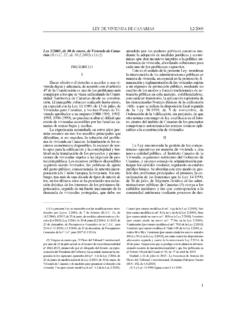Transcription of Housing and the Economy: Policies for Renovation
1 Housing and the economy : Policies for RenovationChapter from forthcoming:Economic Policy Reforms 2011 Going for GrowthEconomic Policy Reforms 2011 Going for Growth OECD 20113 PART II Chapter 4 Housing and the Economy: Policies for Renovation11 This chapter compares a number of Housing Policies for a range of OECD countriesand concludes that badly-designed Policies can have substantial negative effects onthe economy , for instance by increasing the level and volatility of real house pricesand preventing people from moving easily to follow employment of these Policies played an important role in triggering the recent financial andeconomic crisis and could also slow down the recovery.
2 The chapter makes somerecommendations for efficient and equitable Housing Policies that can alsocontribute to macroeconomic stability and Housing AND THE economy : Policies FOR RENOVATIONECONOMIC POLICY REFORMS 2011: GOING FOR GROWTH OECD 20114 Summary and conclusionsBadly-designed Housing Policies played an important role in triggering the recenteconomic and financial crisis. This chapter investigates how Housing Policies should bedesigned to ensure adequate Housing for citizens, support growth in long-term livingstandards and strengthen macroeconomic intervene in Housing markets to enhance people s Housing opportunitiesand to ensure equitable access to Housing .
3 These interventions include fiscal measures, suchas taxes and subsidies; the direct provision of social Housing or rent allowances; and variousregulations influencing the quantity, quality and price of Housing . Housing Policies also havea bearing on overall economic performance and living standards, in that they can influencehow households use their savings as well as residential and labour mobility, which is crucialfor reallocating workers to new jobs and geographical areas. Indeed, as recent OECD analysisshows, effectively supervised financial and mortgage market development combined withpolicies that enhance Housing supply flexibility are key for macroeconomic stability.
4 Themain conclusions of that analysis are summarised below, and each is then described in moredetail in the remaining sections of this chapter: Innovations in mortgage markets should be coupled with appropriate regulatory oversight andprudent banking regulations. Financial liberalisation and mortgage innovations haveincreased access to credit and lowered the cost of Housing finance. This has had positiveimplications for previously credit-constrained households, allowing them a betterchance of owning their own home. But regulatory reforms in mortgage markets may alsobe behind a noticeable increase in house prices by an average of 30% in OECD countries and in house price volatility.
5 Moreover, deregulation can pose risks formacroeconomic stability if it triggers a significant relaxation in lending standards and asubsequent increase in non-performing loans. This is why there is a need for regulatoryoversight and prudent banking regulations. Housing supply responsiveness to demand can be improved in many OECD countries, but care isneeded to avoid volatility in residential Housing investment. Supply of new Housing that isresponsive to prices helps to avoid excessive volatility in house prices, but greaterresponsiveness can also translate into more volatile residential can be increased by streamlining cumbersome construction licensingprocedures, and in countries with a shortage of land for residential construction byencouraging the use of land through better linking the assessment of property value fortax purposes to the market value.
6 Housing Policies can facilitate residential mobility, better match workers with jobs and help thelabour market recover from the recent crisis. For example: Estimates suggest that increasing the responsiveness of Housing supply from the lowlevel that prevails in the Netherlands to the average OECD level would increasehouseholds annual mobility rate by around 50%, possibly because a responsive supplyevens out Housing costs across Housing AND THE economy : Policies FOR RENOVATIONECONOMIC POLICY REFORMS 2011: GOING FOR GROWTH OECD 20115 Easier access to credit is also associated with higher household mobility, because itprovides access to more Housing options and makes it easier to finance moving , high leverage rates can also pose risks to mobility as households withnegative equity are often unable to Easing the relatively strict rent controls and tenant-landlord regulations that arefound in some Nordic and continental European countries could significantly increaseresidential mobility by improving the supply of rental Housing and preventing thelocking-in of tenants.
7 Reducing the high costs involved with buying a residence that exist in somecontinental European countries could also enhance residential mobility. This wouldinclude tax restructuring and removing or curbing regulations that limit competitionamong intermediaries involved in Housing transactions ( and real estateagencies). Housing Policies should be designed to be efficient and equitable: Remove tax distortions by taxing Housing and alternative investments in the sameway; this implies taxing imputed rents and allowing mortgage interest to be taxdeductible. Tax treatment of owner-occupied Housing is often favourable relative toother forms of investment, notably due to the fact that imputed rental income isgenerally not taxed, while mortgage interest is often deductible.
8 Such tax treatmentcan have undesirable consequences for the allocation of savings and investment inhousing and in other markets. Moreover, tax breaks tend to be capitalised in houseprices, thereby preventing some financially-constrained households from owningtheir home. Mortgage interest deductibility also tends to favour the better off, sincethe propensity to own a house rises with income. However, most countries do not taximputed rent; using recurrent property taxes as a substitute is not sufficient as thesetaxes are not large enough to offset the mortgage subsidy. In such circumstances a second best approach could be either to remove mortgage interest relief or to scaleup recurrent property taxes by levying them on cadastral values that are aligned withmarket values.
9 Redesign regulations that bring rents far out of line with market values or tilt thebalance of tenant-landlord relations disproportionally in favour of either party. Strictrental regulations are associated with lower quantity and quality of Housing and theirbenefits for tenants are not certain. Indeed there is no clear evidence that averagerents in countries with stricter controls are lower. Moreover, especially if they arepoorly targeted, rental market regulations may have undesirable redistributive effectsamong different categories of tenants. Use carefully-designed, targeted social Housing systems and portable rent allowancesto ensure Housing for low-income households.
10 Social Housing systems which aredirected to those most in need seem able to achieve their goals at a lower cost thanless targeted systems, although they need to be carefully designed to avoid anyadverse implications for social mix, mobility and associated labour market portable Housing allowances may be preferable to the direct provisionof social Housing as they do not seem to directly hinder residential Housing AND THE economy : Policies FOR RENOVATIONECONOMIC POLICY REFORMS 2011: GOING FOR GROWTH OECD 20116 Housing Policies and recent Housing market developmentsThe extreme developments in Housing markets were a key feature of the currenteconomic crisis and the run up to it ( , 2010).















